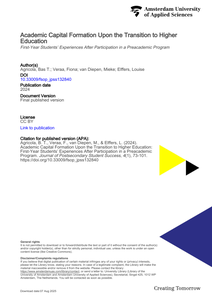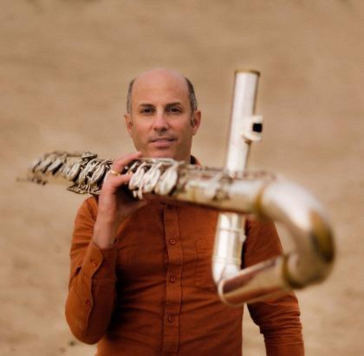The transition from secondary education to the first year of higher education is a phase in which students are faced with many challenges. First-year students may lack the academic capital that is needed to understand explicit and implicit rules of higher education. We investigated students’ participation in a preacademic program and the development of their academic capital. In a mixed method study, we showed that first-year students who participated in a preacademic program perceived peer mentors and teachers to be relevant sources of information, learned how to overcome educational barriers, and became more acquainted with explicit and implicit college requirements.
LINK
The transition from secondary education to the first year of higher education is a phase in which students are faced with many challenges. First-year students may lack the academic capital that is needed to understand explicit and implicit rules of higher education. We investigated students’ participation in a preacademic program and the development of their academic capital. In a mixed method study, we showed that first-year students who participated in a preacademic program perceived peer mentors and teachers to be relevant sources of information, learned how to overcome educational barriers, and became more acquainted with explicit and implicit college requirements.
DOCUMENT

Energy transition is key to achieving a sustainable future. In this transition, an often neglected pillar is raising awareness and educating youth on the benefits, complexities, and urgency of renewable energy supply and energy efficiency. The Master Energy for Society, and particularly the course “Society in Transition”, aims at providing a first overview on the urgency and complexities of the energy transition. However, educating on the energy transition brings challenges: it is a complex topic to understand for students, especially when they have diverse backgrounds. In the last years we have seen a growing interest in the use of gamification approaches in higher institutions. While most practices have been related to digital gaming approaches, there is a new trend: escape rooms. The intended output and proposed innovation is therefore the development and application of an escape room on energy transition to increase knowledge and raise motivation among our students by addressing both hard and soft skills in an innovative and original way. This project is interdisciplinary, multi-disciplinary and transdisciplinary due to the complexity of the topic; it consists of three different stages, including evaluation, and requires the involvement of students and colleagues from the master program. We are confident that this proposed innovation can lead to an improvement, based on relevant literature and previous experiences in other institutions, and has the potential to be successfully implemented in other higher education institutions in The Netherlands.
Students in Higher Music Education (HME) are not facilitated to develop both their artistic and academic musical competences. Conservatoires (professional education, or ‘HBO’) traditionally foster the development of musical craftsmanship, while university musicology departments (academic education, or ‘WO’) promote broader perspectives on music’s place in society. All the while, music professionals are increasingly required to combine musical and scholarly knowledge. Indeed, musicianship is more than performance, and musicology more than reflection—a robust musical practice requires people who are versed in both domains. It’s time our education mirrors this blended profession. This proposal entails collaborative projects between a conservatory and a university in two cities where musical performance and musicology equally thrive: Amsterdam (Conservatory and University of Amsterdam) and Utrecht (HKU Utrechts Conservatorium and Utrecht University). Each project will pilot a joint program of study, combining existing modules with newly developed ones. The feasibility of joint degrees will be explored: a combined bachelor’s degree in Amsterdam; and a combined master’s degree in Utrecht. The full innovation process will be translated to a transferable infrastructural model. For 125 students it will fuse praxis-based musical knowledge and skills, practice-led research and academic training. Beyond this, the partners will also use the Comenius funds as a springboard for collaboration between the two cities to enrich their respective BA and MA programs. In the end, the programme will diversify the educational possibilities for students of music in the Netherlands, and thereby increase their professional opportunities in today’s job market.

In June 2016, two Dutch SME companies which are active in the area of urban solid waste management approached the International Environmental Sciences department of Avans about the current R&D activities on urban solid waste management in cooperation with the Federal University of Minas Gerais (UFMG) Brazil. The companies had interest in developing activities in Brazil, since they are aware of the great potential for exporting both knowledge and technology. Solid waste poses a major problem in Brazil which affects 200 million residents. The Brazilian municipalities collect around 71 million tons solid municipal waste on a yearly basis and only a tiny percentage of this collected waste gets recycled. As such. the overwhelming majority of the collected urban solid waste goes to landfills. Within the State of Minas Gerais there are 850 towns of which 600 have less than 20.000 residents and are agriculturally oriented. Current organic waste composting practices take place under very poor conditions (pathogens and weeds still remain in the compost) and most often the resulting compost product is not well received by its residential and agricultural consumers. As such there is huge room for improvement. The SME companies work with Avans and UFMG to address these challenges. The joint research team consisting of the two Dutch SME companies and the two Research and educational institutes have defined the following research question: What is the current status of organic solid waste management in Minas Gerais and how can cooperation between Brazil and the Netherlands result in a win-win for both countries? Two individual KIEM VANG proposals have been defined in order to address these challenges. The planned activities are a joint effort with professor R. T. de Vasconcelos Barros of the Universidade Federal de Minas Gerais (UFMG) and are executed within the Living Lab Biobased Brazil program (www.biobasedbrazil.org).
Lectoraat, onderdeel van NHL Stenden Hogeschool